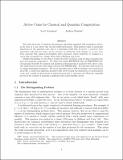Advice coins for classical and quantum computation
Author(s)
Aaronson, Scott; Drucker, Andrew Donald
DownloadAaronson_Advice coins.pdf (269.6Kb)
OPEN_ACCESS_POLICY
Open Access Policy
Creative Commons Attribution-Noncommercial-Share Alike
Terms of use
Metadata
Show full item recordAbstract
We study the power of classical and quantum algorithms equipped with nonuniform advice, in the form of a coin whose bias encodes useful information. This question takes on particular importance in the quantum case, due to a surprising result that we prove: a quantum finite automaton with just two states can be sensitive to arbitrarily small changes in a coin’s bias. This contrasts with classical probabilistic finite automata, whose sensitivity to changes in a coin’s bias is bounded by a classic 1970 result of Hellman and Cover.
Despite this finding, we are able to bound the power of advice coins for space-bounded classical and quantum computation. We define the classes BPPSPACE/coin and BQPSPACE/coin, of languages decidable by classical and quantum polynomial-space machines with advice coins. Our main theorem is that both classes coincide with PSPACE/poly. Proving this result turns out to require substantial machinery. We use an algorithm due to Neff for finding roots of polynomials in NC; a result from algebraic geometry that lower-bounds the separation of a polynomial’s roots; and a result on fixed-points of superoperators due to Aaronson and Watrous, originally proved in the context of quantum computing with closed timelike curves.
Date issued
2011-06Department
Massachusetts Institute of Technology. Department of Electrical Engineering and Computer ScienceJournal
Automata, Languages and Programming
Publisher
Springer Berlin / Heidelberg
Citation
Aaronson, Scott, and Andrew Drucker. “Advice Coins for Classical and Quantum Computation.” Automata, Languages and Programming. Ed. Luca Aceto, Monika Henzinger, & Jiří Sgall. Vol. 6755. Berlin, Heidelberg: Springer Berlin Heidelberg, 2011. 61–72. Web. 27 June 2012. © Springer Berlin / Heidelberg
Version: Author's final manuscript
ISBN
978-3-642-22005-0